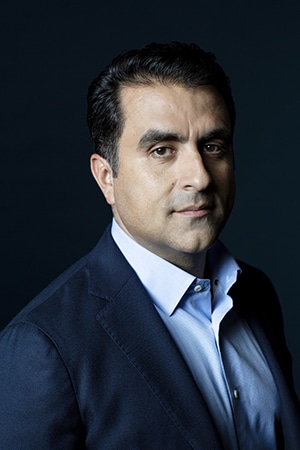|
Getting your Trinity Audio player ready...
|
In more than twelve years of meeting Latino executives and sharing their stories, I have noticed a pattern emerge among these professional narratives. Perhaps this pattern has been understood in the Latino community and it is just new to me.
This consistent theme found in our success stories can only be explained as something stemming from our DNA; that we Latinos are uniquely positioned to lead in a global marketplace. As members of the Latin American diaspora, we have an innate global perspective that, one could argue, gives us a competitive edge.
Our unique position is clearly found in the stories of executives who were born in Latin America, started their professional careers abroad, and then reestablished themselves here to help lead US-based global corporations.
That’s what I see when I read the story of Graciela Ivonne Monteagudo, who started her career working in marketing roles at a Mexico brand of Procter & Gamble. Later, she became the first Latin American fellow of the International Women’s Forum and has since dedicated her career to advancing the understanding of US Hispanic and Latin American consumers. “Critical target markets for CPG and retail companies,” she says.
It is the exact story of our cover subject, Antonio Neri, who was born in Argentina, raised between Argentina and Italy, and, at the age of twenty-seven, hired by Hewlett-Packard for his technical prowess despite failing an English test. Twenty-three years later, he was promoted to president and CEO of Hewlett-Packard Enterprise—a position in which he thrives today.
“How rich is the history of our diaspora and how vibrant that dialogue becomes when we recognize our global relevance and come together to make the idea of American business leadership be one that is truly Américano.”
There is a dynamism to the transnational, Latino-specific dialogue that occurs between US Latinos and Latinos who start their careers abroad. Though there are as many differences between the two groups as there are identities—differences in upbringing, socioeconomic status, race, gender, politics, and even culture—there is also a shared experience and an understanding that can unite us: Latinos from Latin America who are “global citizens,” as Neri calls himself, come to the US to make a home and find labels and stereotypes that many US Latinos have been navigating all their lives.
Latin American leaders born abroad who now lead in the US have, in many instances, adopted the mantle of “Hispanic” to help in our collective effort to pull up other Latinos. It is a responsibility that comes with the territory and one that should be welcomed by all. It is also a reflection of our diversity and strength as a truly global community, because together we can have a more effective impact on the trajectory of American corporations. After all, a rising tide raises all boats.
On the other side of this transnational dialogue is the one coming from Latinos born and raised in the US: a group with historical richness and equal global relevance. That history reflects the connection our country has with our southern neighbors—connections that push America closer to América.
As explained by our guest editor Roel Campos when talking about the impetus behind the upcoming Latino Gallery in the Smithsonian’s National Museum of American History: “Few Americans realize that we have had Latinos in America long before the United States was a country, going back to the 1500s. St. Augustine in Florida is the earliest Spanish settlement. . . . There have always been Latinos in America in great numbers. The US—when it took over portions of Mexico that were previously part of Spain—it took on a population that spoke Spanish and that had a Spanish and Mexican culture and heritage.”
The current climate and discussion around the legacy of “los conquistadores” do not simply complicate the conversation but also reflect how ingrained Latinidad is in American history—as well as how issues surrounding identity, the legacies of race and class, the treatment of native populations in both North and South America are (sadly) somewhat similar through-out the Western Hemisphere.
Either way, this history anchors our American narrative closer to that of Latin America’s. If anything, it makes the case that the history of the United States is as close to a Eurocentric one as it is a Latin American one.
But what about yet another dimension? One that highlights the impact an Estadounidense can have when the cross-national dialogue starts in the US and heads south?
Like the story shared with me by David Ruiz, an executive with UPS whose career took him to leadership positions worldwide, culminating in the role as president of UPS Florida before he retired. I first heard his story several years ago, and it stayed with me so profoundly that I had to meet him recently just to hear it again.
Ruiz’s parents immigrated from Mexico and raised Ruiz in Chicago. When Ruiz was in college, his father wanted him to be an attorney, so Ruiz studied criminal justice in a pre-law track. To earn money, he worked at UPS, and “got on a list” to become a driver, supervisor, manager, etc. and rise through the ranks. After graduating, when he told his dad he wanted to stay on at UPS instead of pursuing a legal career, his father found the decision questionable but supported him.
Years later, when Ruiz became president of UPS Mexico, he hosted his family in his new Mexico City home. While drinking cognac and smoking a cigar on a veranda overlooking the splendor of the ancient capital, his father remarked to him in astonishment, “I left this country thirty-five years ago to look for opportunity, and thirty-five years later, my son is back here creating opportunity.”
The stories in this letter are windows into the complex, dynamic, cross-national dialogue on what makes Latino leadership so compelling. How rich is the history of our diaspora and how vibrant that dialogue becomes when we recognize our global relevance and come together to make the idea of American business leadership be one that is truly Américano.

Pedro A. Guerrero
CEO of Guerrero Media
Publisher of Hispanic Executive
Other Letters from the Publisher

